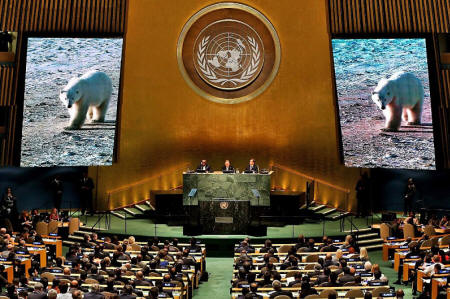|

by Susanne Posel
December 15, 2014
from
OccupyCorporatism Website

The United Nations (UN)
My World
survey is an attempt to understand what is most important to
people from all walks of life, in every country, across the globe.
With over 7 million participants in the
survey, issues the UN is interested in include:
-
Transportation and roads
-
Forests, rivers and oceans
-
Climate change
-
Access to food
-
Ethical government
-
Political freedom
-
Clean water and sanitation
-
Crime and violence
-
Access to internet and phone
-
Employment
-
Gender equality
-
Energy
-
Healthcare
-
Discrimination and persecution
-
Education
-
Disabilities
Author and former climatology professor
for the University of Winnipeg (UW)
Tim Ball
asserted:
"Climate change has happened, is
happening and will always happen. Contrary to the message of the
last thirty years, current rate of climate change is well within
the bounds of natural variability.
Thus, a perfectly natural
phenomenon became the biggest deception in history."
Ball continued:
"The UN must get out of the climate
field entirely. In particular, their Intergovernmental Panel on
Climate Change and the Framework Convention on Climate Change
have always been biased political instruments and should be
immediately disbanded.
Then the agency should focus only on
issues the people of the world deem important."
Tom Harris, executive director of the
International Climate Science Coalition (ICSC) pointed out that,
"the 7 million people polled so far
indicate that, in comparison with issues such as education,
health care, jobs, and energy, they care very little about
climate change.
Perhaps most out of touch with reality is the UN
Secretary General Ban Ki-moon himself who on Wednesday asserted
that climate change remains his 'top priority’."
Terry Dunleavy, strategic advisor for
the ICSC explained that Ban Ki-moon, general secretary for the UN is
incorrect when he claimed,
"science has not only spoken - it is
shouting from the rooftops. Our planet has a fever - and it is
getting hotter every day."
Dunleavy said:
"Not only is climate science highly
uncertain but there has been no statistically significant global
warming for 18 years despite a 9% rise in carbon dioxide to a
still miniscule 0.04% of our atmosphere.
As the scientists
explained in their 2012 open letter to Mr. Ban,
'Global warming
that has not occurred cannot have caused the extreme weather of
the past few years'."
When it comes to deciphering the real
effects of climate change, it seems every year is the warmest year
on record.
The National Oceanic and Atmospheric
Administration (NOAA)
stated that 2012 was one of the 10 warmest years on record. The
next year, NOAA
claimed that 2013 was the 4th warmest year on record. And it just so happens that NOAA
is decrying that 2014 will be the "hottest year on record so
far".
Zhengyu Liu, professor of atmospheric
and ocean sciences at the University of Wisconsin, explains:
"Data from observation suggests that
the Earth is cooling while the physical data suggests the
complete opposite."
Liu has been working with professors
from many other academias to understand
the obvious cooling of the
planet:
-
Rutgers University
-
National Center for Atmospheric
Research
-
Alfred Wegener Institute for
Polar and Marine Research
-
University of Hawaii
-
University of Reading
-
Chinese Academy of Sciences
-
University of Albany
The issue has been termed the Holocene
Temperature Conundrum (HTC) which is
explained:
"A recent temperature reconstruction
of global annual temperature shows Early Holocene warmth
followed by a cooling trend through the Middle to Late Holocene
[Marcott SA, et al., 2013, Science 339(6124):1198–1201].
This global cooling is puzzling
because it is opposite from the expected and simulated global
warming trend due to the retreating ice sheets and rising
atmospheric greenhouse gases.
Our critical reexamination of this
contradiction between the reconstructed cooling and the
simulated warming points to potentially significant biases in
both the seasonality of the proxy reconstruction and the climate
sensitivity of current climate models."
Lui suggested:
"Over the last 10,000 years, Liu
says, we know atmospheric carbon dioxide rose by 20 parts per
million before the 20th century, and the massive ice sheet of
the Last Glacial Maximum has been retreating.
These physical changes suggest that,
globally, the annual mean global temperature should have
continued to warm, even as regions of the world experienced
cooling, such as during the Little Ice Age in Europe between the
16th and 19th centuries."
|

